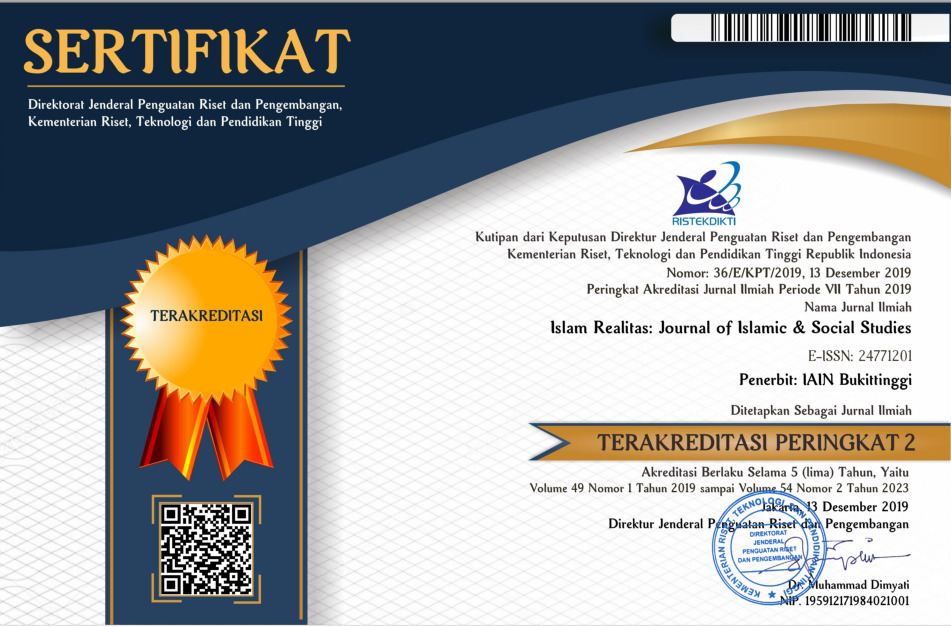Implementation of Religious Moderation on "MUI Lampung" Youtube Channel
DOI:
https://doi.org/10.30983/fuaduna.v7i1.6220Keywords:
Religious Moderation, Tolerance, MUI LampungAbstract
References
Aini, Nurul, Isra Aulia, and Zulfahmi. 2022. “Melawan Intoleransi Dan Ekstremisme Media Sosial: Inovasi Kampanye Moderasi Beragama Kanal Youtube Labpsa Tv.†Jurnal Sosiologi Agama Indonesia (JSAI) 3 (1): 69–81. https://doi.org/10.22373/jsai.v3i1.1687.
Aksa, Aksa, and Nurhayati Nurhayati. 2020. “Moderasi Beragama Berbasis Budaya Dan Kearifan Lokal Pada Masyarakat Donggo Di Bima:Tinjauan Sosio-Historis.†Harmoni 19 (2): 338–52. https://doi.org/10.32488/harmoni.v19i2.449.
Al-Hakim, Lukman, and Alfan Bachtiar. 2021. “Dakwah Online Dalam Perspektif Masyarakat Modern Di Media Sosial Youtube.†KOMUNIKATA57: Jurnal Ilmiah Ilmu Komunikasi 2 (2): 75–82. https://doi.org/10.55122/kom57.v2i2.265.
Aminudin, Aminudin. 2016. “Media Dakwah.†Al-Munzir: Jurnal Kajian Ilmu-Ilmu Komunikasi Dan Bimbingan Islam 9 (6): 344–63. https://doi.org/https://dx.doi.org/10.31332/am.v9i2.786.
Ananta Devi, Dwi. 2009. Toleransi Beragama. Semarang: Alprin.
Anggraini, Laila Fitria. 2021. “Moderasi Beragama Dalam Media Sosial: Analisis Wacana Model Van Dijk Pada Channel Youtube Najwa Shihab.†IAIN Purwokerto.
Arya, BW. 2022. “Moderasi Beragama Perspektif Emha Ainun Najib Dalam Mewujudkan Toleransi Beragama Dan Relevansinya Terhadap Pendidikan Agama Islam.†UIN Raden Intan Lampung.
Aziz, Abdul. 2021. “Merawat NKRI Dengan Moderasi Beragama - YouTube.†MUI Lampung. 2021. https://www.youtube.com/watch?v=_cHLof4RZe8.
Aziz, Moh Ali. 2017. Ilmu Dakwah. Jakarta: Kencana.
Aziz, Mokhamad Abdul. 2018. “Netizen Jurnalisme Dan Tantangan Dakwah Di Media Baru.†Islamic Communication Journal 3 (2): 121. https://doi.org/10.21580/icj.2018.3.2.3096.
Choliq, M. A. 2022. “Aplikasi Analisis Wacana Kritis Norman Fairclough Dalam Buku ‘Wasathiyyah Wawasan Islam Tentang Moderasi Beragama.’†UIN Sunan Ampel Surabaya.
Eriyanto. 2012. Analisis Wacana: Pengantar Analisis Teks Media. Yogyakarta: LKiS.
Fatih, Moh Khoirul. 2020. “Pesan Dakwah Moderasi Beragama Dalam Program Muslim Travelers NET TV Tahun 2020: Analisis Tayangan Komunitas Muslimah Di Irlandia.†Alamtara: Jurnal Komunikasi Dan Penyiaran Islam 4 (2): 114–30. https://ejournal.iai-tabah.ac.id/index.php/alamtaraok/article/view/1071.
Febriani, Suci Ramadhanti, and Apri Wardana Ritonga. 2022. “The Perception of Millennial Generation on Religious Moderation through Social Media in the Digital Era.†Millah: Jurnal Studi Agama 21 (2): 313–34. https://doi.org/10.20885/millah.vol21.iss2.art1.
Fridiyanto, Muhammad Rafii, and Muhammad Sobri. 2021. “Kontribusi Perguruan Tinggi Nahdlatul Ulama: Membangun Islam Moderat, Inklusif, Dan Kebangsaan.†In Prosiding Muktamar Pemikiran Dosen PMII, 173–89. https://prosiding.muktamardosenpmii.com/index.php/mpdpmii/article/view/21.
Haris, Aidil, and Asrinda Amalia. 2018. “Makna Dan Simbol Dalam Proses Interaksi Sosial: Sebuah Tinjauan Komunikasi.†Jurnal Dakwah Risalah 29 (1): 16–19. https://doi.org/10.24014/jdr.v29i1.5777.
Helmy, Muhammad Irfan, Ahmad Darojat Jumadil Kubro, and Muhamad Ali. 2021. “The Understanding of Islamic Moderation (Wasatiyyah Al-Islam) and the Hadiths on Inter-Religious Relations in the Javanese Pesantrens.†Indonesian Journal of Islam and Muslim Societies 11 (2): 377–401. https://doi.org/10.18326/ijims.v11i2.351-376.
Ismail, A, S.R. Tibek, F.M. Sham, A.G. Don, and M.F. Ashaari. 2015. “Basic Preparation for Practical Training in Preaching to the Non-Muslims among Students of the Department of Dakwah and Leadership Studies, Faculty of Islamic Studies, Ukm.†Turkish Online Journal of Educational Technology, 90–95.
Kementerian Agama RI. 2019. Moderasi Beragama. Jakarta: Badan Litbang dan Diklat Kementerian Agama RI.
Kriyantono, Rachmat. 2006. Teknik Praktis Riset Komunikasi Kuantitatif Dan Kualitatif. Jakarta: Prenadamedia Group.
Lampung, MUI. n.d. “Perkuat Dakwah Digital, MUI Lampung Luncurkan Channel Youtube MUI Lampung – MUI Lampung.†Accessed February 8, 2022a. http://mui-lampung.or.id/2020/08/03/perkuat-dakwah-digital-mui-lampung-luncurkan-channel-youtube-mui-lampung/.
———. n.d. “Sejarah – MUI Lampung.†Accessed February 8, 2022b. http://mui-lampung.or.id/category/sejarah/.
Nasir, Muhammad, and Muhammad Khairul Rijal. 2021. “Keeping the Middle Path: Mainstreaming Religious Moderation through Islamic Higher Education Institutions in Indonesia.†Indonesian Journal of Islam and Muslim Societies 11 (2): 213–41. https://doi.org/10.18326/ijims.v11i2.213-241.
Nuraini, Dwike. 2020. “Konstruksi Berita Moderasi Beragama Sebagai Upaya Mencegah Radikalisme: Analisis Framing Rubrik Dialog Jumat Republika.†UIN Syarif Hidayatullah Jakarta. https://repository.uinjkt.ac.id/dspace/handle/123456789/51760.
Rahmat, Al Fauzi. 2021. “Dakwah Digital: Eksplorasi Gerakan Filantropi Muhamamdiyah Selama Covid-19 Di Media Sosial Twitter ‘@muhammadiyah.’†ETTISAL : Journal of Communication, no. Vol 6, No 1 (2021): ETTISAL: Journal of Communication: 1–19. https://ejournal.unida.gontor.ac.id/index.php/ettisal/article/downloadSuppFile/5027/1059.
Ramaputra, Muhammad Atha, and Subhan Afifi. 2021. “Analisis Strategi Kreatif Konten Promosi Usaha Foodies Melalui Media Sosial Instagram.†Jurnal Ilmiah Manajemen Informasi Dan Komunikasi 5 (2): 16–35.
Ramdhan, Tri Wahyudi. 2018. “Dimensi Moderasi Islam.†Al-Insyiroh: Jurnal Studi Keislaman 2 (2): 29–48. https://doi.org/10.35309/alinsyiroh.v2i2.3320.
Rizky, Fasha Umh, and Nur Syam. 2021. “Komunikasi Persuasif Konten Youtube Kementerian Agama Dalam Mengubah Sikap Moderasi Beragama.†Jurnal Ilmu Komunikasi 11 (1): 16–33. https://doi.org/10.15642/jik.2021.11.1.16-33.
Thohri, Muhammad. 2019. “Media Dan Dakwah Moderasi : Melacak Peran Strategis Dalam Menyebarkan Faham Moderasi Di Situs Nahdlatul Wathan On-Line Situs Kalangan Netizen Muslim-Santri.†Tasamuh 17 (1): 155–80. https://doi.org/https://doi.org/10.20414/tasamuh.v17i1.1440.
Wilhelm, Claudia, Helena Stehle, and Hanne Detel. 2021. “Digital Visibility and the Role of Mutual Interaction Expectations: Reframing the Journalist–Audience Relationship through the Lens of Interpersonal Communication.†New Media & Society 23 (5): 1004–21. https://doi.org/10.1177/1461444820907023.
Wong, Lai-Wan, Garry Wei-Han Tan, Jun-Jie Hew, Keng-Boon Ooi, and Lai-Ying Leong. 2022. “Mobile Social Media Marketing: A New Marketing Channel among Digital Natives in Higher Education?†Journal of Marketing for Higher Education 32 (1): 113–37. https://doi.org/10.1080/08841241.2020.1834486.
Zamzami, Mutataqin Al. 2019. “Konsep Moderasi Dakwah Dalam M. Quraish Shihab Official Website.†Jurnal Bimas Islam 12 (1): 123–48. https://doi.org/10.37302/jbi.v12i1.98.
Downloads
Additional Files
Published
How to Cite
Issue
Section
Citation Check
License
Copyright (c) 2023 Erda Ermawati, Muhamad Bisri Mustofa, Siti Wuryan, Ocha Nasria Putri

This work is licensed under a Creative Commons Attribution-ShareAlike 4.0 International License.
Authors who publish with this journal agree to the following terms:
- Authors retain copyright and grant the journal right of first publication with the work simultaneously licensed under a Creative Commons Attribution-ShareAlike 4.0. that allows others to share the work with an acknowledgment of the work's authorship and initial publication in this journal.
- Authors are able to enter into separate, additional contractual arrangements for the non-exclusive distribution of the journal's published version of the work (e.g., post it to an institutional repository or publish it in a book), with an acknowledgment of its initial publication in this journal.
- Authors are permitted and encouraged to post their work online (e.g., in institutional repositories or on their website) prior to and during the submission process, as it can lead to productive exchanges, as well as earlier and greater citation of published work (See The Effect of Open Access).





